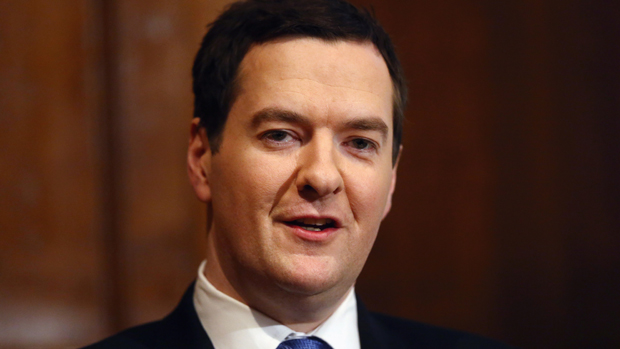Osborne's call for minimum wage rise is 'cunning politics'
Press agrees rise is needed, but says timing of announcement is attack on Ed Miliband

A free daily email with the biggest news stories of the day – and the best features from TheWeek.com
You are now subscribed
Your newsletter sign-up was successful
GEORGE OSBORNE says he wants to see an above-inflation rise in the minimum wage. The Chancellor told the BBC that the improving health of the UK economy meant the country "can now afford" to raise the rate from £6.31 an hour at present to £7 an hour by 2015.
The Times applauds the announcement which, it says, would "return the purchasing power of the minimum wage to the level it was in 2008, since when its value has fallen in real terms".
While Osborne's proclamation can be seen as something of a stunt – the chancellor has no formal power to raise the minimum wage - it also makes sense from a political perspective, the paper says. Labour has been making substantial political capital from what it calls the "cost of living crisis" and lifting the minimum wage will blunt the Opposition's attack somewhat.
The Week
Escape your echo chamber. Get the facts behind the news, plus analysis from multiple perspectives.

Sign up for The Week's Free Newsletters
From our morning news briefing to a weekly Good News Newsletter, get the best of The Week delivered directly to your inbox.
From our morning news briefing to a weekly Good News Newsletter, get the best of The Week delivered directly to your inbox.
The Financial Times agrees that the timing of yesterday's announcement was highly political. It was scheduled to overshadow today's speech by Labour leader Ed Miliband on how he would tackle the cost of living crisis.
Politics aside, raising the minimum wage "makes a lot of economic sense" says The Guardian. "Prices have been rising more quickly than wages for the whole of the current parliament, squeezing real incomes and threatening to put the brake on the recovery. Lobbying for a higher minimum wage is one direct way the government can influence the level of consumer demand."
The Guardian says the "sniffy" response to the idea from business groups including the CBI was predictable.
"But only a couple of weeks ago, the CBI was itself calling for firms to raise wages during 2014," says The Guardian. "It can hardly bellyache now that the chancellor has responded to its call."
A free daily email with the biggest news stories of the day – and the best features from TheWeek.com
The Daily Telegraph's James Kirkup agrees that Osborne's announcement is politically motivated – aimed "fairly and squarely at the Labour leader".
In that sense, the timing is rather curious, writes Kirkup. Why? Because "a lot of people (including Labour people) think the Miliband argument is running out of steam, since wages are starting to creep up and inflation is easing. Surely a traditional Tory free-marketeer would now be sitting back and letting the Coalition's 'long-term plan' gently lifts wages and living standards without the dead hand of state intervention?"
Political blogger Guido Fawkes adds a note of dissent to the media's mostly positive responses to the idea of a minimum wage rise. He describes the idea as "fundamentally unsound" from an economic point of view, but concedes that it's "politically cunning".
Fawkes quotes the Adam Smith Institute to support his view that raising the wage rise will backfire. "Even if the immediate impact is not large, this increase will lead to a long-run decline in job creation and standards for Britain's poorest workers," the Institute says. "It will hurt the very people it is supposed to help."
-
 6 of the world’s most accessible destinations
6 of the world’s most accessible destinationsThe Week Recommends Experience all of Berlin, Singapore and Sydney
-
 How the FCC’s ‘equal time’ rule works
How the FCC’s ‘equal time’ rule worksIn the Spotlight The law is at the heart of the Colbert-CBS conflict
-
 What is the endgame in the DHS shutdown?
What is the endgame in the DHS shutdown?Today’s Big Question Democrats want to rein in ICE’s immigration crackdown
-
 How corrupt is the UK?
How corrupt is the UK?The Explainer Decline in standards ‘risks becoming a defining feature of our political culture’ as Britain falls to lowest ever score on global index
-
 How long can Keir Starmer last as Labour leader?
How long can Keir Starmer last as Labour leader?Today's Big Question Pathway to a coup ‘still unclear’ even as potential challengers begin manoeuvring into position
-
 The high street: Britain’s next political battleground?
The high street: Britain’s next political battleground?In the Spotlight Mass closure of shops and influx of organised crime are fuelling voter anger, and offer an opening for Reform UK
-
 Is a Reform-Tory pact becoming more likely?
Is a Reform-Tory pact becoming more likely?Today’s Big Question Nigel Farage’s party is ahead in the polls but still falls well short of a Commons majority, while Conservatives are still losing MPs to Reform
-
 Taking the low road: why the SNP is still standing strong
Taking the low road: why the SNP is still standing strongTalking Point Party is on track for a fifth consecutive victory in May’s Holyrood election, despite controversies and plummeting support
-
 What difference will the 'historic' UK-Germany treaty make?
What difference will the 'historic' UK-Germany treaty make?Today's Big Question Europe's two biggest economies sign first treaty since WWII, underscoring 'triangle alliance' with France amid growing Russian threat and US distance
-
 Is the G7 still relevant?
Is the G7 still relevant?Talking Point Donald Trump's early departure cast a shadow over this week's meeting of the world's major democracies
-
 Angela Rayner: Labour's next leader?
Angela Rayner: Labour's next leader?Today's Big Question A leaked memo has sparked speculation that the deputy PM is positioning herself as the left-of-centre alternative to Keir Starmer